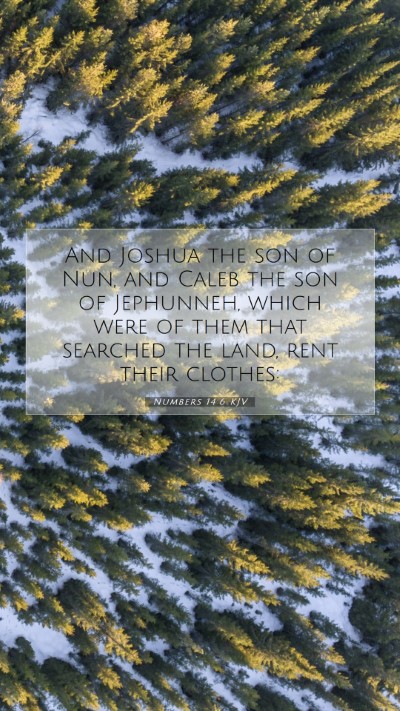Understanding Numbers 14:6
In Numbers 14:6, we find a significant moment in Israel's journey to the Promised Land, reflecting on issues of faith, fear, and rebellion. This verse states:
"And Joshua the son of Nun, and Caleb the son of Jephunneh, which were of them that searched the land, rent their clothes."
Summary of Context
Before delving into the verse itself, it is essential to understand the preceding events that lead to this point in Scripture. The Israelites had just received a report from the twelve spies who surveyed Canaan. The majority reported fearfully about the strength of its inhabitants, invoking discouragement among the people. In contrast, Joshua and Caleb stood firm in their faith, advocating for trust in God’s promise, which positions this verse as a pivotal moment in their leadership.
Insights from Commentaries
- Matthew Henry:
Henry notes that Joshua and Caleb's act of tearing their robes signifies deep mourning and distress over the people's disbelief and rebellion. This external expression of grief showcases their genuine concern for the nation of Israel and their devotion to God’s will.
- Albert Barnes:
Barnes emphasizes the boldness of Joshua and Caleb. Their actions are not merely about the land’s report, but illustrate a larger spiritual battle: faith versus fear. They trusted that God would enable them to enter the Promised Land, highlighting an essential principle in Bible verse understanding—the importance of faith in God's promises.
- Adam Clarke:
Clarke elaborates on the symbolism of the torn clothes, linking it to ancient practices of mourning and dramatic expressions of sorrow. He also notes that this act demonstrated Joshua and Caleb's strong leadership, as they sought to rally the people back to trust in God, which serves as a powerful commentary on Biblical exegesis and the role of godly leadership in challenging times.
Key Themes and Interpretations
Through Numbers 14:6, several overarching themes emerge:
- Faith in Adversity:
The verse reflects the necessity of maintaining faith even when circumstances seem daunting. Joshua and Caleb serve as an example of unwavering trust in God, which resonates throughout Biblical study lessons.
- Mourning for Rebellion:
The act of tearing their clothes symbolizes the gravity of rejecting God’s promises and choices. It emphasizes the emotional weight of spiritual leadership in guiding a community.
- Leadership and Responsibility:
The actions of Joshua and Caleb highlighted the importance of strong leaders who prioritize faith in God, positioning them as role models in understanding Scripture.
- The Consequence of Unbelief:
This passage serves as a reminder of the dangers that arise from a collective lack of belief in God’s promises. The people’s rebellion led to significant repercussions, a theme often explored in in-depth Bible verse analysis.
Cross References
Several other scripture passages can deepen our understanding of Numbers 14:6:
- Exodus 6:7 - God’s promise to deliver His people.
- Deuteronomy 1:36 - Caleb’s reward for his faithfulness.
- Hebrews 3:19 - The connection between unbelief and disobedience in God's people.
Applications for Today
This verse invites readers to consider several applications for daily life:
- How to interpret Bible verses:
Seek to understand the historical and spiritual context behind faith-testing situations.
- Applying Bible verses to daily life:
Encourage reliance on God in the face of fears. How can one stand firm like Joshua and Caleb amid adversity?
- Engaging in Bible study groups:
Discuss themes of faith and leadership with others, encouraging mutual growth and understanding of Scripture.
Conclusion
Numbers 14:6 serves as a profound reminder of the battles that exist between faith and fear. By analyzing this verse through the lenses of various public domain commentaries, we gain a richer understanding of its meaning, themes, and applications, allowing us to develop a deeper comprehension of the Bible verse meanings and interpretations. This verse encourages believers to demonstrate unwavering faith and to mourn the spiritual struggles within their communities, leading to growth in their personal discipleship journeys.


